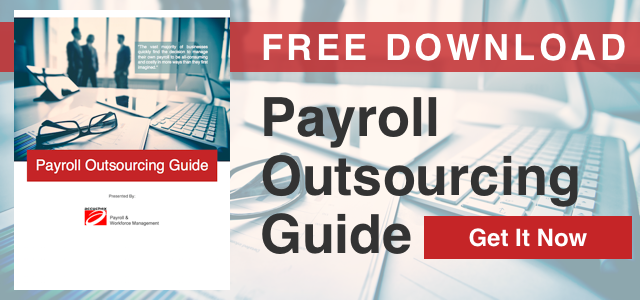 Every business can benefit from an improved payroll management process. But knowing exactly what to change or implement can often be challenging. Just making random changes or simply installing new software is not the answer.
Every business can benefit from an improved payroll management process. But knowing exactly what to change or implement can often be challenging. Just making random changes or simply installing new software is not the answer.
In order for your payroll management system improvements to be truly effective you must address your overall process, the technology you are using, and the best practices that need to be implemented.
And, while every business is somewhat unique in their payroll process needs, there are certain steps you can take that apply to most every company.
Improving Your Payroll Management One Step At A Time
Taking the time to plan and implement strategic changes and improvements will prove to be a valuable investment for you and your team.
Here are seven ways to achieve immediate results in improving your payroll management process:
1. Upgrade Your Payroll Software
Upgrading your payroll software can make quickly streamline the processing of payroll for your business. With newer, state-of-the-art payroll technology, you may see a significant decrease in the time spent processing payroll while ensuring greater accuracy in data entry and processing. Keep in mind, however, that a computer program alone will not solve all your process issues.
2. Create a Paperless Payroll Process
Paperless payroll is the direct result of improved technology and can serve to expedite your payroll operations. If yours is like most businesses, you are already looking for ways to “go green", cut costs, and maintain the security of your company's data. One way of accomplishing this is with a paperless payroll process.
Eliminating time cards or time sheets, physical paychecks, and paper pay stubs can be huge steps in that direction. Adopting an online portal system for your employees not eliminates most of paper being used, a majority of employees prefer to receive their check stubs and pay information electronically. Done right, implementing a paperless payroll process is a win-win for everyone.
3. Invest in Ongoing Training and Education
Continual education and training is critically important for organizations and this is especially true for HR and payroll professionals. Payroll management has never been a static profession, but is dynamic and evolving. Changes in technology, in available tools and services, and regulation requires payroll professionals to be constantly "up to speed."
The role of the HR Manager is constantly expanding and, in many ways, evolving as business changes, technology progresses, and the demands on the human resources departments shift. On-going education - whether formal or self-administered - is essential for the successful HR professional.
4. Consolidate Your Pay Schedules
Many companies maintain different pay schedules, such as monthly paydays for management and weekly, or bi-weekly pay periods, for hourly employees. While it may make sense on some levels, in practice it can lead to errors in your payroll process.
“Minimizing pay cycles can help prevent the duplication of multiple processes so that the payroll department can operate more efficiently,” says Tiffany Washington, owner/founder of Washington Accounting Services. “To maximize efficiency, every type of employee should be paid on the same pay schedule (weekly, bi-weekly, or monthly). This will allow the payroll department to focus on one task at a given time. Having one pay schedule to maintain instead of three is a lot easier to maintain. It will also lessen the chance for errors to be made during the payroll process.”
5. Simplify Your Systems
Having an online payroll system that is state-of-the-art can still be problematic if it doesn’t work with your company's accounting system, for example. And having a multitude of systems for capturing, tracking, inputting, and processing employee hours, etc. can create a multitude of "pain points" - steps where mistakes are often made or data lost.
Simplifying, consolidating, or streamlining your existing systems is an effective means for improving your overall payroll management process. Reviewing all the steps involved and taking time to analyze the process from a high-level perspective can help you and your team find ways to optimize how you do what you do.
6. Keep Up With State and Federal Tax Requirements
It cannot be emphasized enough how critical it is for businesses to stay abreast of the myriad of IRS and other government agency compliance rules and regulations. The potential cost to businesses that fail to meet deadlines or miss filing certain forms altogether can be devastating, especially to smaller businesses. Payroll tax filing is a business necessity, but it needn't be a such a costly burden.
Make it a mandatory element of your ongoing processes to review and know your State and the Federal payroll, employee, and tax regulations and changes. By being fully informed and up to date, you and your staff will avoid a significant amount of costly mistakes and delays.
7. Consider Outsourcing Your Payroll Process
If you’re a small business owner and you don't have the time or resources to invest in building a new payroll system or updating an older one, outsourcing to a professional, full-service payroll management company can be a strategic and cost-effective option.
One of the foremost trends in payroll management in businesses is the move to outsource these functions to a Payroll Management Services provider, such as Accuchex. This is a major trend among businesses both large and small as many discover that their cost savings far outweigh the investment.
According to a study released earlier this year by staffing services firm Robert Half and Financial Executives Research Foundation, the research affiliate of Financial Executives International, forty-seven percent of U.S. companies reported outsourcing payroll.
Larger companies tend to be more likely to outsource payroll, with the survey showing that 73% of companies with revenues of $5 billion or more outsourced this function. And outsourcing of tax filing rose in 2014 to 42%, up from 30% in 2013.
Payroll Management Is A Dynamic Process
As a payroll management professional, your job reqires that you facilitate a variety of tasks and processes. Because of ever-changing regulations, rules, and legislation, you must constantly stay apprised of the compliance aspect of your job. Changes in technology, your own company structure, and best practices require that you stay agile and ready to shift accordingly.
Streamlining and optimizing your payroll management process is one of the major ways you can minimize the burden of all these dynamic elements of your role.
Another direction you can consider is outsourcing. This can be simply outsourcing one process such as payroll. However, with a full-service provider such as Accuchex, you have additional options for outsourcing as well.
Let Accuchex help you in managing your HR needs, payroll processes, and staying on top of compliance demands. Get your Free Download: Payroll Outsourcing Guide to help you make an informed decision or call Accuchex Payroll Management Services at 877-422-2824.


